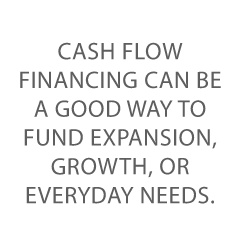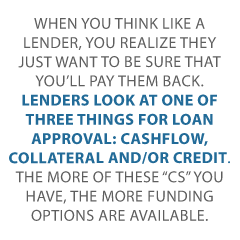How Many Kinds of Financing for a Small Business Can YOU Name?
You may be surprised at the many kinds of financing for a small business there are.
Fundability
Any discussion of business financing has to start with fundability. Fundability is the ability of a business to get funding. It covers all the points a lender or credit provider will look at when they’re trying to figure out if you’ll pay back a loan or credit extended to you. These include factors you probably haven’t thought about or might think aren’t so important. Business details like address and entity all matter. But there’s more.
The 3 Cs Capital Acquisition Formula
When you think like a lender, you realize they just want to be sure that you’ll pay them back. Lenders look at one of three things for loan approval: cashflow, collateral and/or credit. The more of these “Cs” you have, the more funding options are available. For the forms of funding we’re showcasing today, we show you exactly what you need to have for approval.
Two More General Ways to Get Funding
If you have absolutely none of the 3 Cs, there are still two other options: selling a part of your business or grants and crowdfunding. Let’s look at types of funding covering all of these options. We’ll start with financing via your business’s cash flow.
#10. Financing for a Small Business with Cash flow: Cash Flow Financing
A loan made to a company is backed by a company’s expected cash flow. A company’s cash flow is the amount of cash that flows in and out of a business, in a specific period. Cash flow financing (or a cash flow loan) uses generated cash flow as a means to pay back the loan.
Cash flow: Cash Flow Financing: Terms and Qualifying
Often you will need to have a few years in business. You may need to meet a certain minimum credit score requirement. You will need to prove historical cash flow and present your accounts receivables and accounts payables. This way, the lender can determine how much to loan to your business.
#9. Financing for a Small Business with Cash flow: Merchant Cash Advances
An MCA technically isn’t a loan. Rather, it is a cash advance based upon the credit card sales of a business. A small business can apply for an MCA and have an advance deposited into its account fairly quickly. So you can offer Net 30 terms but not have to wait a month to get paid.
Merchant Cash Advances
A merchant financing program is ideal for business owners who accept credit cards and are looking for fast and easy business financing. An MCA program is designed to help you get funding based strictly on your cash flow, as verifiable per your business banks statements. Hence lenders in general will not ask for any burdensome document requests.
Terms and Qualifying
A lender will review 3 months of bank and merchant account statements. They are looking for is consistent deposits. And they want to see deposits showing revenue is $50,000 or higher per year. They will also verify time in business of 6 months or more.
Lenders are also looking to see that you don’t have a lot of Non-Sufficient-Funds (NSFs) showing on your bank statements. They want to see you don’t have a lot of chargebacks on your merchant statements. And they want to see that you have more than 10 deposits in a month going into your bank account. They want to see that you manage your bank and merchant accounts responsibly. And they want to see that have a decent number of consistent credit card transaction deposits each month.
Let’s move onto funding based upon collateral – either yours, or a credit partner’s, or from the business itself.
Demolish your funding problems with 27 killer ways to get cash for your business.
#8. Financing for a Small Business with Collateral: Inventory Financing
Inventory financing is a revolving line of credit or a short-term loan acquired by a company so it can purchase products for sale later. The products serve as the collateral for the loan. There may be restrictions on the type of inventory you can use. This can include not allowing cannabis, alcohol, firearms, etc., or perishable goods. There can be revenue requirements. And there may also be minimum FICO score requirements.
Terms and Qualifying
Get approved for a line of credit for 50% of inventory value, regardless of personal credit quality. Rates are usually 5 – 15% depending on type of inventory. You can get funding within 3 weeks or less. But it can’t be lumped together inventory, like office equipment.
#7. Financing for a Small Business with Collateral: Account Receivables Financing
You can use outstanding account receivables as collateral for financing. If you also have purchase orders, you can get financing to have those filled. You won’t need to use your cash flow to do so. Get an accounts receivable credit line with rates of less than 1% with no consumer credit requirement. Receivables should be with the government or another business.
Terms and Qualifying
Get as much as 80% of receivables advanced ongoing in less than 24 hours. Remainder of the accounts receivable are released once the invoice is paid in full. Factor rates are as low as 1.33%. You can get an accounts receivable credit line with rates of less than 1% with no consumer credit requirement.
Now it’s time to move onto funding with good personal credit (FICO) scores.
#6. Financing for a Small Business with Good Personal Credit: Credit Line Hybrid
A credit line hybrid is a form of unsecured funding. Our credit line hybrid has an even better interest rate than a secured loan. Get some of the highest loan amounts and credit lines for businesses. Get 0% business credit cards with stated income. These report to business CRAs. You can build business credit at the same time. This will get you access to even more cash with no personal guarantee.
Terms and Qualifying
You need a good credit score or a guarantor with good credit to get an approval (a FICO score of at least 680). There are no financials required. You can often get a loan of five times the amount of current highest revolving credit limit account. So this is up to $150,000.
#5. Financing for a Small Business with Good Personal Credit: Bridge Loans
A bridge loan is a short-term loan used until a person or company secures permanent financing or removes an existing obligation. It allows the user to meet current obligations by providing immediate cash flow. Bridge loans are short term, up to one year. They have relatively high interest rates. And they are often backed by some form of collateral, like real estate or inventory.
Bridge Loans via Our Credit Line Hybrid
The Credit Suite Credit Line Hybrid has a term loan program. This bridge loan works as either an add-on to, or in lieu of, the program, when the applicant meets eligibility and is agreeable to either a portion (or all) of their funding, supplied in the form of cash term loans. There is a fixed monthly repayment.
Terms and Qualifying
The Credit Suite program is an aggregate program requiring multiple accounts to meet our prequalification. Get $25,000 to $300,000 per applicant. The APR is 7 – 24% depending on creditworthiness and selected term. Terms are 3, 5, or 7 years. You must have a 680 FICO or better, and over $35,000 in adjusted gross income. Actual pre-qualification will depend on Debt-to-Income ratio.
#4. Financing for a Small Business with Good Business Credit: Start with Vendor Credit and Retail Credit
Starter vendors are open to working with most businesses, even startup ventures. Make sure vendors report to the CRAs – not all do. Vendors report to the business CRAs within 60 days. They help you build your business credit profile and score. Terms will vary depending on the vendor, but they tend to be Net 30. And you will not need collateral, good personal credit, or cash flow.
Move onto Retail Credit
Retail credit comes from major retailers. Buy everything from office supplies to power tools. Retailers will check whether your business information is uniform everywhere. They will also check whether your business is properly licensed
Terms and Qualifying
Qualifications will vary, and there can be a minimum time in business requirement. There may even be a minimum number of employees requirement, or a minimum annual sales requirement. Terms can be revolving. You will need at least 3 (5 is better) accounts reporting to the business CRAs.
#3. Financing for a Small Business with Good Business Credit: Fleet Credit and Bank Credit Cards
Fleet credit is used to buy fuel, maintain vehicles of all sorts, and repair vehicles. Even businesses which don’t have big fleets can still benefit. These are usually gas credit cards. Requirements will vary. There may be a minimal time in business requirement. If your business doesn’t make the time in business requirement, you may be able to instead offer a personal guarantee or give a deposit to secure the credit.
A Look at Bank Credit Cards
More bank credit cards are more universal, like MasterCard. So they can be used pretty much anywhere. These cards may even have rewards programs. Terms can be revolving. Usually, you will need to have at least 14 accounts reporting to the business CRAs. There can be longer time in business requirements. And there may also be minimum number of employee requirements.
Now let’s look at financing you can get if you’re all right with sharing the profits and ownership of your business.
Demolish your funding problems with 27 killer ways to get cash for your business.
#2. Financing for a Small Business via Selling Part of Your Business: Angel Investing
Angel investors invest in small startups or entrepreneurs. Often, angel investors are among an entrepreneur’s family and friends. The capital they provide may be a one-time investment to help the business get started, or an ongoing injection of money to support and carry the company through its early stages. Angels are not covered by the Securities Exchange Commission’s (SEC) standards for accredited investors.
Angels could be friends or colleagues sitting on home equity, or local professionals who are looking to invest. Consider people you know well and people you don’t know so well. But keep in mind, you’re giving up part of your ownership in your business.
Angel Investing: Terms and Qualifying
Angels are informal investors so there really aren’t any terms. Technically, there is nothing done for qualifying although investors may (probably should) insist on a valuation of your business. But no matter what, it’s always a good practice to get everything in writing.
#1. Financing for a Small Business via Selling Part of Your Business: Equity Crowdfunding
This is not the same as reward-based crowdfunding (like from Kickstarter). Equity crowdfunding is a stock offering from a company that is not listed on stock exchanges. Equity crowdfunding has been around for less than 10 years. Potential investors visit a funding portal website. There, they can explore different equity crowdfunding investment opportunities. Note: there are limits on how much capital an individual can invest based on their income and net worth. Equity crowdfunding gives investors a stake in your business.
Terms and Qualifying
Equity crowdfunding tends to be covered by complex federal law. It is best practices to consult with an attorney well-versed in federal law, specifically, securities and corporations when it comes to interpreting terms and qualifications. A lawyer will also be able to comprehend any changes that may be made to these aspects of the law in the future.
Let’s move onto kinds of funding you don’t need to pay back.
Bonus #1. Financing for a Small Business via Federal Grants
Federal grants generally do not have to be paid back. Try HUD (Housing and Urban Development) for urban projects. Try the USDA (Department of Agriculture) for rural projects. Federal funding means paperwork. You often must show experience in what you are proposing.
Terms and Qualifying
Grants have varying qualifications. They are very competitive. Be sure to check information thoroughly. This includes due dates and any necessary paperwork. Some grants may offer preferences to businesses with minority, female, veteran, or disabled ownership.
Bonus #2. Financing for a Small Business via Reward-Based Crowdfunding
You can get money from the crowd for your business. Start with a service like Kickstarter. But make sure you read the fine print (always a good idea!). Many crowdfunding platforms make you give all the funding back if you do not make your goal by the end of the campaign. But Indiegogo has a flexible funding option.
Reward-Based Crowdfunding
Crowdfunding platforms will take a percentage of the donations. That’s how they make their money. Crowdfunding platforms may push to have you deliver on your promises. So you’ll have to actually manufacture a product or do whatever else your business is supposed to be doing. Given how much social media we’re all bombarded with these days, it should come as no surprise that donors can become weary of crowdfunding pitches.
Details
Crowdfunding tends to work best when donors can personally connect with a product or service. Straightforward businesses may not do so well. The kinds of businesses which do the best often associate with products not quite on the shelves yet, or artistic endeavors. But standard widgets will most likely not attract brand ambassadors. They probably won’t get donors too fired up. Because crowdfunding campaigns are time-consuming, it doesn’t make sense to try this form of funding unless you realistically feel your chance of success is better than 50%.
Terms and Qualifying
Terms will differ depending on which platform you use. Check and make sure your platform of choice will allow your industry to work with them. For example, even though recreational cannabis use is legal in Massachusetts, Kickstarter (for example) doesn’t allow fundraising for drugs, nicotine, tobacco, vaporizers, and related paraphernalia. Any major crowdfunding platform has a section for rules, a FAQ, or ‘how it works’. Be sure to read such a section thoroughly so you know exactly what you’re getting yourself into.
And now let’s look at funding via creative and different means you may not have considered or heard of before.
Demolish your funding problems with 27 killer ways to get cash for your business.
Bonus #3: Financing for a Small Business via 401(k) Financing
This is not a loan. You will not have to pay an early withdrawal fee or a tax penalty. You put the money back by contributing, just like with any 401(k) program. This means you won’t lose your retirement funds. This is a 401(k) Rollover for Working Capital program. The IRS calls it a Rollover for Business Startups (ROBS).
401(k) Financing
Per the IRS, a ROBS qualified plan is a separate entity with its own set of requirements. The plan, through its company stock investments, rather than the individual owns the trade or business. Therefore, some filing exceptions for individuals may not apply to such a plan. This type of financing isn’t a loan against, your 401(k), so there’s no interest to pay. It does not use the 401(k) or stocks as collateral. Instead, this is simply a movement or change of custodian.
Terms and Qualifying
Pay low rates, often less than 5%. Your 401(k) will need to have more than $35,000 in it. You can usually get up to 100% of what’s “rollable” within your 401(k). The lender will want to see a copy of your two most recent 401(k) statements. You can get 401(k) financing even with severely challenged personal credit. The 401(k) you use cannot be from a business where you are currently employed. You cannot be currently contributing to it.
Bonus #4: Financing for a Small Business with Microloans
Microloans are business loans with relatively low interest rates. Generally, these loans are offered to small or developing businesses with modest capital requirements and little to no revenue history. Microloans — as the name suggests — are smaller loans than a traditional bank loan. They generally offer anywhere from $500 to $50,000 in business financing.
Terms and Qualifying
Terms and requirements vary among providers. Kiva, for example, charges 0% interest. The Opportunity Fund provides loans to low- and moderate-income immigrants, women, and other underserved small business owners. Accion requires a cosigner. Check the specific requirements of any microloan program that interests you
Bonus #5: Financing for a Small Business via SBA 7(a) Loans
This the SBA’s most popular loan. The SBA guarantees 85% for loans up to $150,000. They guarantee 75% for loans greater than $150,000. The SBA makes the lending decision, but qualified lenders may be granted delegated authority to make credit decisions without SBA review.
Terms and Qualifying
The maximum amount on offer is $5 million. You will have to provide Articles of Organization, business licenses, documentation of lawsuits, judgments and bankruptcy or other pertinent documentation. Lenders are not required to take collateral for loans up to $25,000. For loans in excess of $350,000, the SBA requires that the lender collateralize the loan to the maximum extent possible up to the loan amount.
10 Kinds of Financing for a Small Business: Takeaways
There are all sorts of amazing ways to get business funding. You can find the one which fits your circumstances. This includes your strengths in areas like personal credit, collateral, cash flow, selling a part of your business, and getting grants or crowdfunding. Let us help!
The post 10 Kinds of Financing for a Small Business – Including Options You’ve Probably Never Heard Of appeared first on Credit Suite.
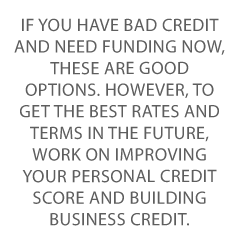
 #5 Business Financing with Bad Credit: Cash Flow Financing or Merchant Account Financing
#5 Business Financing with Bad Credit: Cash Flow Financing or Merchant Account Financing #3 Business Financing With Bad Credit: Other Collateral Financing
#3 Business Financing With Bad Credit: Other Collateral Financing




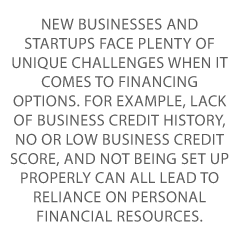

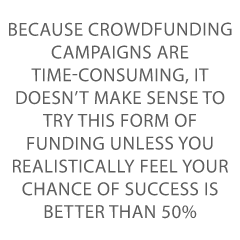 Standard widgets or service-based businesses do not tend to attract brand ambassadors. They won’t tend to get donors too fired up. Because crowdfunding campaigns are time-consuming, it doesn’t make sense to try this form of funding unless you realistically feel your chance of success is better than 50%
Standard widgets or service-based businesses do not tend to attract brand ambassadors. They won’t tend to get donors too fired up. Because crowdfunding campaigns are time-consuming, it doesn’t make sense to try this form of funding unless you realistically feel your chance of success is better than 50%

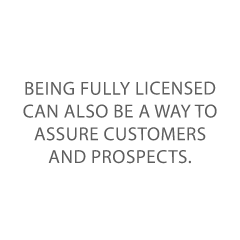

 so much. And once you have a PAYDEX score, they’ll check it as well.
so much. And once you have a PAYDEX score, they’ll check it as well.